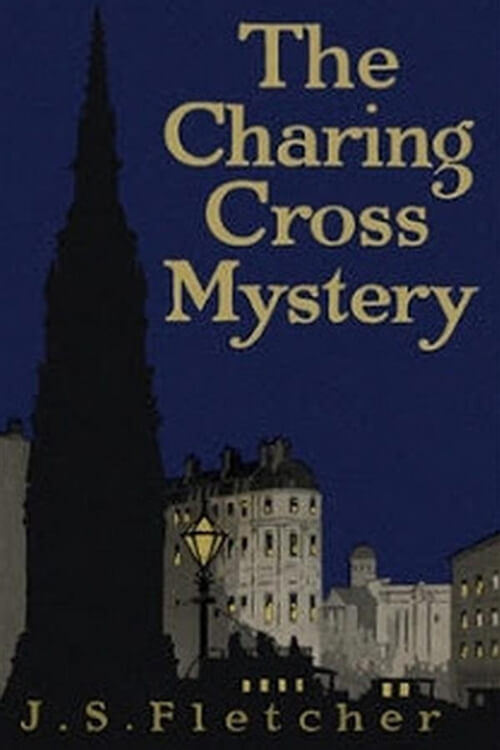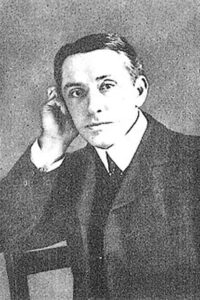
The Charing Cross Mystery
Hetherwick had dined that evening with friends who lived in Cadogan Gardens and had stayed so late in conversation with his host that midnight had come before he left and set out for his bachelor chambers in the Temple; it was, indeed, by a fraction of a second that he caught the last east-bound train at Sloane Square. The train was almost destitute of passengers; the car which he entered, a first-class smoking compartment, was otherwise empty; no one came into it when the train reached Victoria. But at St. James’s Park, two men got in and seated themselves opposite Hetherwick.
Now Hetherwick was a young barrister, going in for a criminal practice, in whom the observant faculty was deeply implanted; it was natural to him to watch and to speculate on anything he saw. Because of this, and perhaps because he had just then nothing else to think about, he sat observing the new-comers; he found interest, amusement, and not a little profit in this sort of thing, and in trying to decide whether a given man was this, that, or something else.
Of the two men thus under inspection, the elder was a big, burly, fresh-colored man of apparently sixty to sixty-five years of age. His closely cropped silvery hair, his smartly trained grey moustache, his keen blue eyes, and his generally alert and vivacious appearance, made Hetherwick think that he was or had been in some way or other connected with the army; this impression was heightened by an erect carriage, square-set shoulders and something that suggested a long and close acquaintance with the methods of the drill-yard and the parade ground. Perhaps, thought Hetherwick, he was a retired non-commissioned officer, a regimental sergeant-major, or something of that sort; this idea, again, was strengthened by the fact that the man carried a handsome walking cane, the head of which, either of gold or silver-gilt, was fashioned like a crown. There was something military, too, about the cut of his clothes; he was a smartly dressed man, from his silk hat, new and glossy and worn a little rakishly on the right side of his head, to his highly polished boots. A well-preserved, cheery-looking, good-humored sort of person, this, decided Hetherwick, and well satisfied with himself and full of the enjoyment of life, and likely, from all outward sight, to make old bones.
The other man came into a different category. The difference began with his clothes, which, if not exactly shabby, were semi-shabby, much worn, ill-kept, and badly put on: he was a careless man, who scorned a clothes brush and was also indifferent to the very obvious fact that his linen was frayed and dirty. He was a thin, meager man, of not one-half the respectable, well-fed bulk of his companion; his sallow-complexioned face was worn, and his beard thin and irregular: altogether he suggested some degree of poor circumstances. Yet, in Hetherwick’s opinion, he was a person of something beyond ordinary mental capacity; his eyes were large and intelligent, his nose was well-shaped, his chin square and determined. His ungloved hands were finely molded and delicate of proportion; the fingers were long, thin, and tapering. Hetherwick noticed two facts about those fingers: the first, that they were restless; the second, that they were much stained as if the man had recently been mixing dyes or using chemicals. And then he suddenly observed that the big man’s hands and fingers were similarly stained—blue and red and yellow, in patches.
Read or download Book
J. S. Fletcher
Joseph Smith Fletcher (7 February 1863 – 30 January 1935) was an English journalist and author. He wrote more than 230 books on a wide variety of subjects, both fiction and non-fiction and was one of the most prolific English writers of detective fiction.
Early life and education
Fletcher was born in Halifax, West Yorkshire, the son of a clergyman. His father died when he was eight months old, and after which his grandmother raised him on a farm in Darrington, near Pontefract. He was educated at Silcoates School in Wakefield, and after some study of law, he became a journalist.
Writing career
At age 20, Fletcher began working in journalism, as a sub-editor in London. He subsequently returned to his native Yorkshire, where he worked first on the Leeds Mercury using the pseudonym A Son of the Soil, and then as a special correspondent for the Yorkshire Post covering Edward VII’s coronation in 1902.
Fletcher’s first books published were poetry. He then moved on to write numerous works of historical fiction and history, many dealing with Yorkshire, which led to his selection as a fellow of the Royal Historical Society.
Michael Sadleir stated that Fletcher’s historical novel, When Charles I Was King (1892), was his best work. Fletcher wrote several novels about rural life in imitation of Richard Jefferies, beginning with The Wonderful Wapentake (1894).
In 1914, Fletcher wrote his first detective novel and went on to write over a hundred more, many featuring the private investigator Ronald Camberwell.
Fletcher published multiple crime fiction novels during the “Golden Age of Detective Fiction,” namely his The Middle Temple Murder (1919) which served as the basic formulaic template for writing detective fiction novels; though, this particular novel (in addition to many of his others) did not share many general traits with those that characterize this particular literary era. On the contrary, it’s argued that Fletcher is an almost exact contemporary of Conan Doyle. Most of his detective fiction works considerably pre-date that era, and even those few published within it do not conform to the closed form and strict rules professed, if not unfailingly observed, by the Golden Age writers.
Personal life
He married the Irish writer Rosamond Langbridge in 1927, with whom he had one son, Rev. Valentine Fletcher, who held various ministries across Yorkshire, including Bradford and Sedbergh, and was himself a writer, author of various children’s books and Chimney Pots and Stacks, on the British domestic chimney pot.






